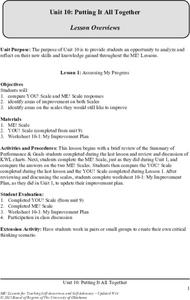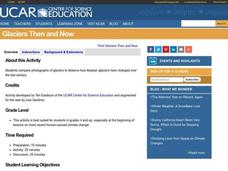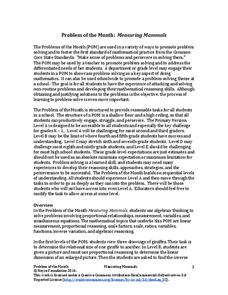Curated OER
Experiencing "Romeo and Juliet"
Ninth graders read and analyze the William Shakespeare play "Romeo and Juliet" and compare it to the 1996 modern version of the play and the movie "West Side Story." They write an essay comparing and contrasting the three versions.
Curated OER
Plate Tectonics: Sixth Grade Lesson Plans and Activities
Here is a set of pre-lab, lab, and post-lab lesson plans on plate tectonics. After completing the previous labs on volcanoes and earthquakes, sixth graders use the gained knowledge to explore plate boundaries and the movement of Earth's...
NASA
Discovering the Milky Way
What do you call a tiny collection of galaxies? A puny-verse! Young scholars graph data gathered by scientists studying Cepheids. They attempt to identify a relationship between the variables through standard and logarithmical graphing....
School Improvement in Maryland
Political Systems: Advantages and Disadvantages
Every political system has advantages and disadvantages. To gain an understanding of these differences, groups investigate the political system of another country—oligarchy, monarchy, dictatorship, parliamentary—and prepare a...
Star Wars in the Classroom
"Shakespeare and Star Wars": Lesson Plan Day 12
Class members compare the final 30 minutes of Lucas's Star Wars: A New Hope with Act V of Doescher's play, William Shakespeare's Star Wars: Verily, A New Hope and consider how the choice of media influences viewers' impression of the...
Inside Mathematics
Marble Game
Pupils determine the theoretical probability of winning a game of marbles. Individuals compare the theoretical probability to experimental probability for the same game. They continue on to compare two different probability games.
University of Oklahoma
Putting It All Together: Assessing My Progress and Portfolio
Celebration time! The final unit in a 10-unit series asks learners to review their work and assess their progress. They complete another YOU! Scale and ME! Scale worksheet and compare the results with the worksheets they created at the...
Curated OER
Exploring Scale And Ratio
Students measure the actual size and distance of the solar system using scale and ratio. They watch and discuss a video, create a distance-scale solar system model, and compare the scale sizes of planets to their actual sizes.
Curated OER
Becoming a Member of an 1830s Family
Students compare and constrast life in an 1830s family verses a modern family. They role play the position of a family member in 1830 while wearing traditional clothing for the time period. They write journal entries to show their daily...
Curated OER
Using Plant Pigments to Link a Suspect to a Crime
High schoolers use chromatography to separate plant pigments collected from a fictitious crime scene and suspects. They compare the Rf values of the plant pigments to determine whether the plant pigments found on any of the suspects...
Curated OER
Everyone's a Critic: Analyzing Sitcoms as Cultural Texts
Start by defining the word sitcom with the goal of launching a discussion. What exactly is a sitcom? How is a sitcom different from sketch comedy, drama, and reality television? Class members give examples, remember storylines they've...
Curated OER
Venn Diagrams
The Venn diagram is an important graphic organizer, and learners should be familiar with it. Here, pupils compare things that are made of plastic and metal, and they identify the things that have both substances in them. There are two...
Statistics Education Web
Using Dice to Introduce Sampling Distributions
Investigate the meaning of a sample proportion using this hands-on activity. Scholars collect data and realize that the larger the sample size the more closely the data resembles a normal distribution. They compare the sample proportion...
Science Friday
Colorful Chromosomes
Everything is in the genes. Individuals observe 14 different traits of themselves. Using pipe cleaners and beads, the learners create models of a chromosome representing their traits. The class then compares and contrasts everyone's...
Science Friday
Fossil Detectives
What can this rock be? Pupils pretend to be paleontologists by sketching fossils and making predictions about their types. To determine whether they can identify the type of dinosaur, class members compare their observations and...
Curated OER
More and Less Handfuls
Working as a pair, two kindergartners will sit at a table and will pick two handfuls of counters. They will combine their individual handfuls into one, and count their own selection. They will then draw and record their count on a record...
Center Science Education
Glaciers: Then and Now
Cooperative groups compare pairs of photos of Alaskan glaciers. They match a historical photo to the recent photo of the same glacier. The class discusses what conditions are necessary for glaciers to retreat. This abbreviated activity...
Polar Bears International
Top of the World
Learn about polar bears and the Arctic circle with a instructional activity about the countries and conditions of the region. After examining how the area differs from Antarctica, kids explore climates, animals, and geographical position...
MENSA Education & Research Foundation
Kingdom Animalia: Classifying Animals
Six lessons, extension activities, and an assessment make up a series of lessons curated to reinforce the concept of classifying animals. Each informative and interactive lesson attributes to the knowledge of the seven levels of...
Houghton Mifflin Harcourt
Grade 4 Reading Item Specifications
Is it the end of the school year and you're in need of test practice? Use a set of reading passages to challenge fourth graders to answer questions based on what they read. Some of the questions require readers to compare and contrast a...
Achieve
BMI Calculations
Obesity is a worldwide concern. Using survey results, learners compare local BMI statistics to celebrity BMI statistics. Scholars create box plots of the data, make observations about the shape and spread of the data, and examine the...
Noyce Foundation
Measuring Mammals
Explore the meaning of scale and proportion with a set of five activities that examines the topic from elementary through high school. The first lessons explore ratio by examining pictures of different sizes. The next three activities...
Mathematics Vision Project
Features of Functions
What are some basic features of functions? By looking at functions in graphs, tables, and equations, pupils compare them and find similarities and differences in general features. They use attributes such as intervals of...
Cornell University
Beam Focusing Using Lenses
Explore optics using an inquiry-based experimental approach! Young scholars use a set of materials to design and build a unit capable of focusing a beam of light. They experiment with different lenses to determine the best approach to...
Other popular searches
- Comparing Sets of Objects
- Comparing Sets of Coins
- Venn Diagrams Comparing Sets
- Comparing Sets of Money
- Comparing Sets of Data
- Nouns and Comparing Sets
- Comparing Two Sets of Data

























